
aiograpi
🔥 Asynchronous Python library for Instagram Private API 2024
Stars: 104
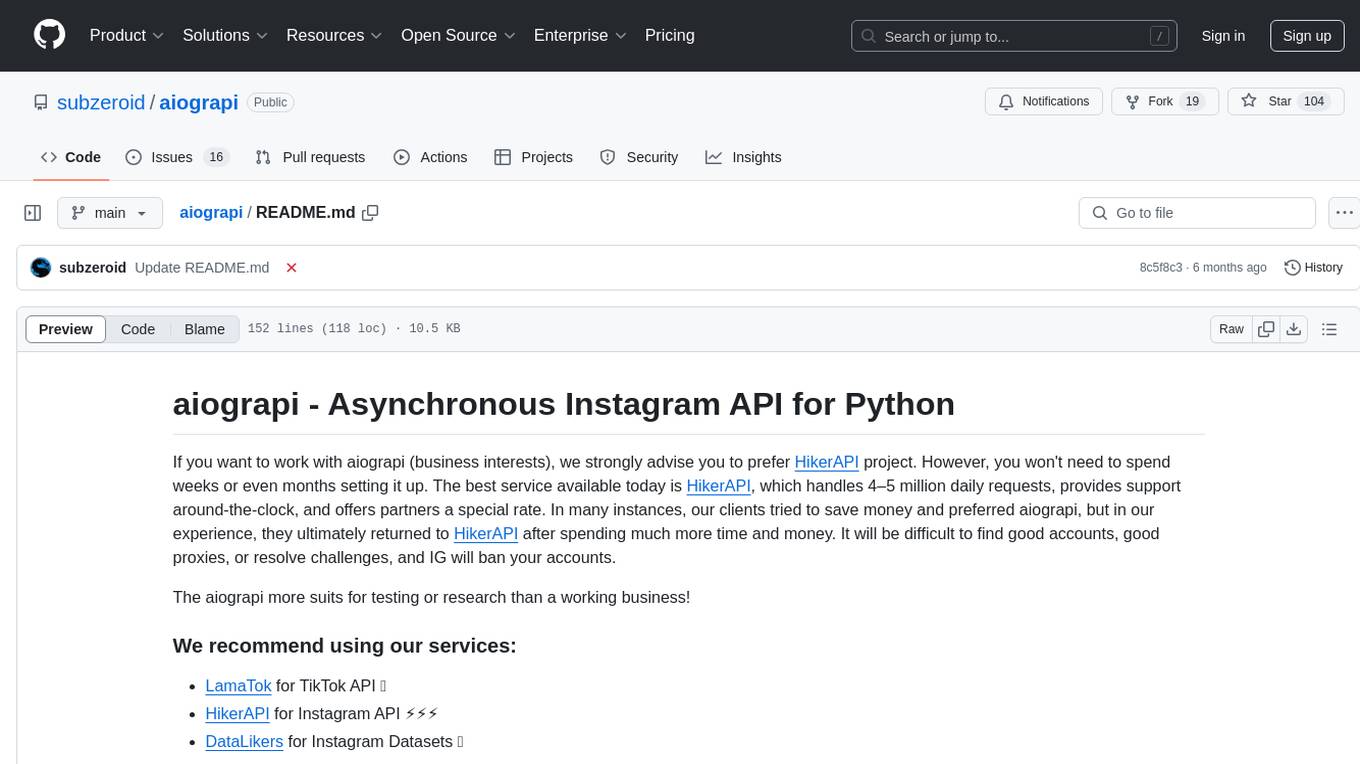
aiograpi is an asynchronous Instagram API wrapper for Python that allows users to interact with various Instagram functionalities such as retrieving public data of users, posts, stories, followers, and following users, managing proxy servers and challenge resolver, login by different methods, managing messages and threads, downloading and uploading various types of content, working with insights, likes, comments, and more. It is designed for testing or research purposes rather than production business use.
README:
If you want to work with aiograpi (business interests), we strongly advise you to prefer HikerAPI project. However, you won't need to spend weeks or even months setting it up. The best service available today is HikerAPI, which handles 4–5 million daily requests, provides support around-the-clock, and offers partners a special rate. In many instances, our clients tried to save money and preferred aiograpi, but in our experience, they ultimately returned to HikerAPI after spending much more time and money. It will be difficult to find good accounts, good proxies, or resolve challenges, and IG will ban your accounts.
The aiograpi more suits for testing or research than a working business!
- LamaTok for TikTok API 🔥
- HikerAPI for Instagram API ⚡⚡⚡
- DataLikers for Instagram Datasets 🚀
Features:
- Getting public data of user, posts, stories, highlights, followers and following users
- Getting public email and phone number, if the user specified them in his business profile
- Getting public data of post, story, album, Reels, IGTV data and the ability to download content
- Getting public data of hashtag and location data, as well as a list of posts for them
- Getting public data of all comments on a post and a list of users who liked it
- Management of proxy servers, mobile devices and challenge resolver
- Login by username and password, sessionid and support 2FA
- Managing messages and threads for Direct and attach files
- Download and upload a Photo, Video, IGTV, Reels, Albums and Stories
- Work with Users, Posts, Comments, Insights, Collections, Location and Hashtag
- Insights by account, posts and stories
- Like, following, commenting, editing account (Bio) and much more else
Asynchronous Instagram Private API wrapper without selenium. Use the most recent version of the API from Instagram, which was obtained using reverse-engineering with Charles Proxy and Proxyman.
Instagram API valid for 27 Feb 2024 (last reverse-engineering check)
Support Python >= 3.10
For any other languages (e.g. C++, C#, F#, D, Golang, Erlang, Elixir, Nim, Haskell, Lisp, Closure, Julia, R, Java, Kotlin, Scala, OCaml, JavaScript, Crystal, Ruby, Rust, Swift, Objective-C, Visual Basic, .NET, Pascal, Perl, Lua, PHP and others), I suggest using instagrapi-rest
Support Chat in Telegram
and GitHub Discussions
- Performs Web API or Mobile API requests depending on the situation (to avoid Instagram limits)
- Login by username and password, including 2FA and by sessionid (and uses Authorization header instead Cookies)
- Challenge Resolver have Email and SMS handlers
- Support upload a Photo, Video, IGTV, Reels, Albums and Stories
- Support work with User, Media, Comment, Insights, Collections, Location (Place), Hashtag and Direct Message objects
- Like, Follow, Edit account (Bio) and much more else
- Insights by account, posts and stories
- Build stories with custom background, font animation, link sticker and mention users
- Account registration and captcha passing will appear
pip install aiograpi
from aiograpi import Client
cl = Client()
await cl.login(ACCOUNT_USERNAME, ACCOUNT_PASSWORD)
user_id = await cl.user_id_from_username(ACCOUNT_USERNAME)
medias = await cl.user_medias(user_id, 20)Additional example
from aiograpi import Client
from aiograpi.types import StoryMention, StoryMedia, StoryLink, StoryHashtag
cl = Client()
await cl.login(USERNAME, PASSWORD, verification_code="<2FA CODE HERE>")
media_pk = await cl.media_pk_from_url('https://www.instagram.com/p/CGgDsi7JQdS/')
media_path = await cl.video_download(media_pk)
subzeroid = await cl.user_info_by_username('subzeroid')
hashtag = await cl.hashtag_info('dhbastards')
await cl.video_upload_to_story(
media_path,
"Credits @subzeroid",
mentions=[StoryMention(user=subzeroid, x=0.49892962, y=0.703125, width=0.8333333333333334, height=0.125)],
links=[StoryLink(webUri='https://github.com/subzeroid/aiograpi')],
hashtags=[StoryHashtag(hashtag=hashtag, x=0.23, y=0.32, width=0.5, height=0.22)],
medias=[StoryMedia(media_pk=media_pk, x=0.5, y=0.5, width=0.6, height=0.8)]
)- Index
- Getting Started
- Usage Guide
-
Interactions
-
Media- Publication (also called post): Photo, Video, Album, IGTV and Reels -
Resource- Part of Media (for albums) -
MediaOembed- Short version of Media -
Account- Full private info for your account (e.g. email, phone_number) -
TOTP- 2FA TOTP helpers (generate seed, enable/disable TOTP, generate code as Google Authenticator) -
User- Full public user data -
UserShort- Short public user data (used in Usertag, Comment, Media, Direct Message) -
Usertag- Tag user in Media (coordinates + UserShort) -
Location- GEO location (GEO coordinates, name, address) -
Hashtag- Hashtag object (id, name, picture) -
Collection- Collection of medias (name, picture and list of medias) -
Comment- Comments to Media -
Highlight- Highlights -
Notes- Notes -
Story- Story -
StoryLink- Link Sticker -
StoryLocation- Tag Location in Story (as sticker) -
StoryMention- Mention users in Story (user, coordinates and dimensions) -
StoryHashtag- Hashtag for story (as sticker) -
StorySticker- Tag sticker to story (for example from giphy) -
StoryBuild- StoryBuilder return path to photo/video and mention co-ordinates -
DirectThread- Thread (topic) with messages in Direct Message -
DirectMessage- Message in Direct Message -
Insight- Insights for a post -
Track- Music track (for Reels/Clips)
-
- Best Practices
- Development Guide
- Handle Exceptions
- Challenge Resolver
- Exceptions
To release, you need to call the following commands:
python setup.py sdist
twine upload dist/*
For Tasks:
Click tags to check more tools for each tasksFor Jobs:
Alternative AI tools for aiograpi
Similar Open Source Tools

aiograpi
aiograpi is an asynchronous Instagram API wrapper for Python that allows users to interact with various Instagram functionalities such as retrieving public data of users, posts, stories, followers, and following users, managing proxy servers and challenge resolver, login by different methods, managing messages and threads, downloading and uploading various types of content, working with insights, likes, comments, and more. It is designed for testing or research purposes rather than production business use.
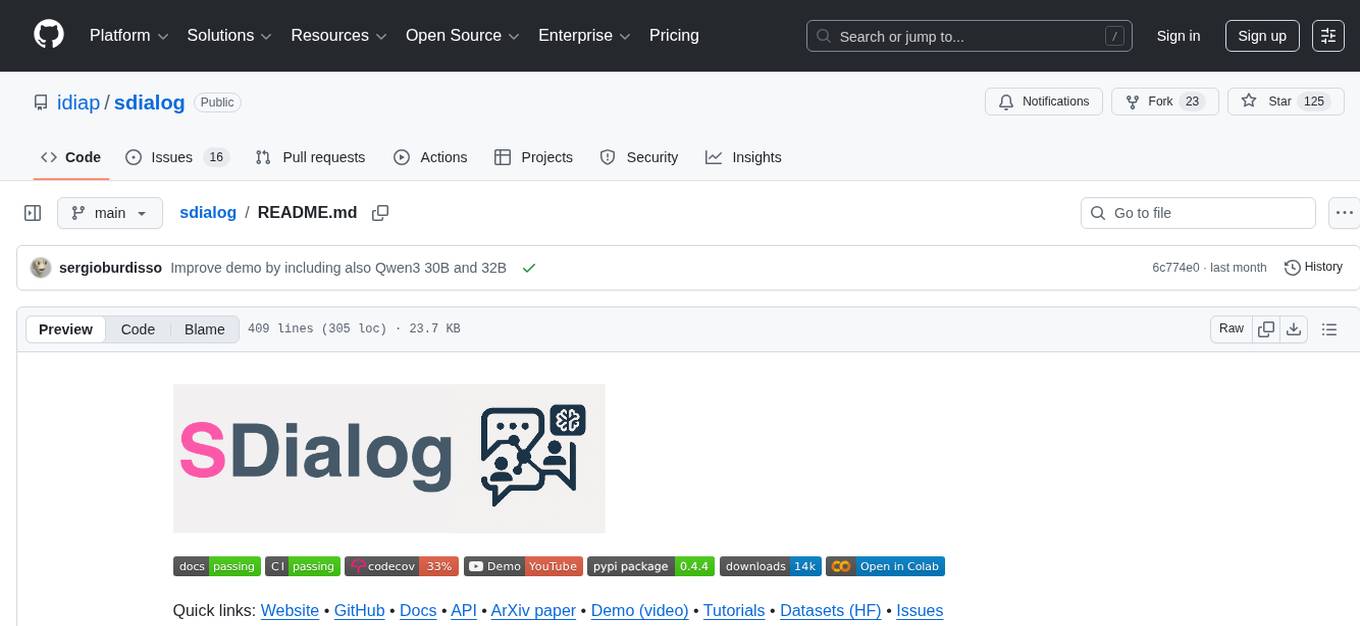
sdialog
SDialog is an MIT-licensed open-source toolkit for building, simulating, and evaluating LLM-based conversational agents end-to-end. It aims to bridge agent construction, user simulation, dialog generation, and evaluation in a single reproducible workflow, enabling the generation of reliable, controllable dialog systems or data at scale. The toolkit standardizes a Dialog schema, offers persona-driven multi-agent simulation with LLMs, provides composable orchestration for precise control over behavior and flow, includes built-in evaluation metrics, and offers mechanistic interpretability. It allows for easy creation of user-defined components and interoperability across various AI platforms.
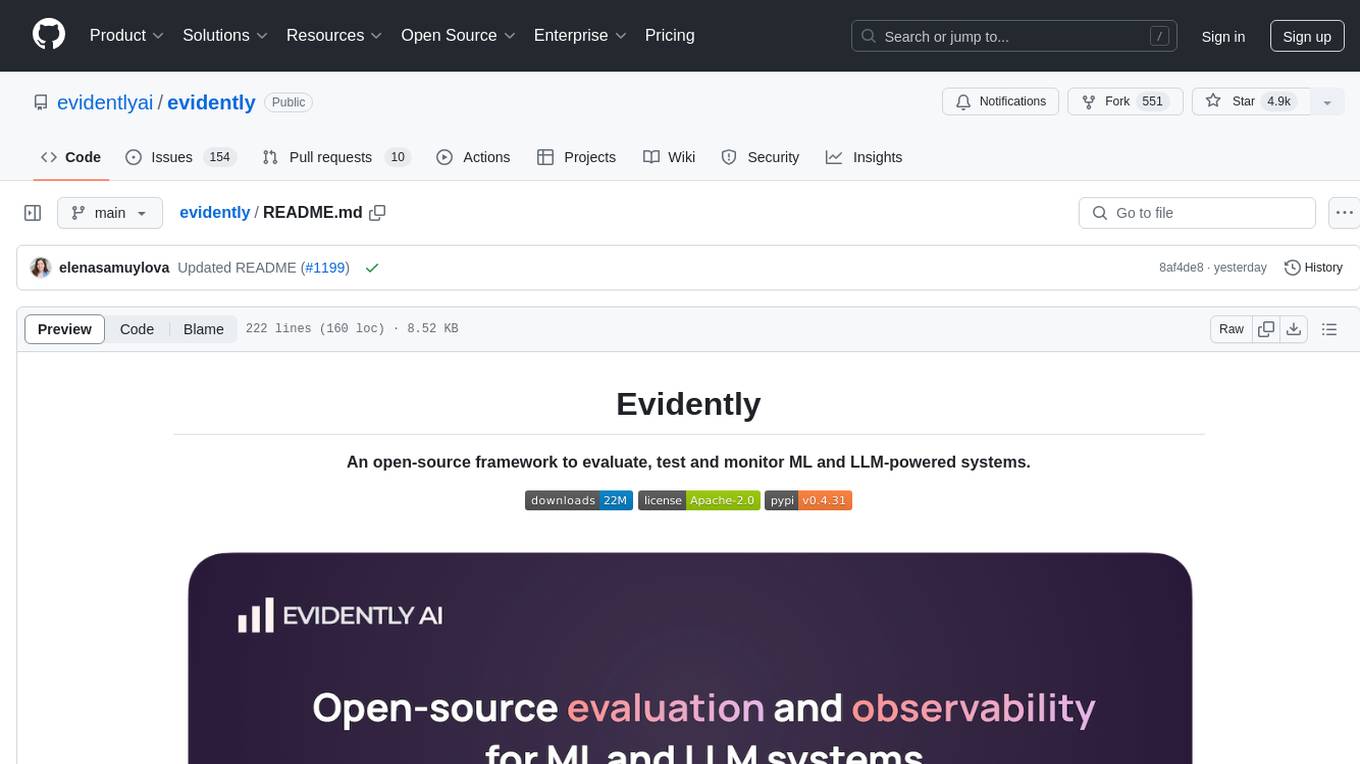
evidently
Evidently is an open-source Python library designed for evaluating, testing, and monitoring machine learning (ML) and large language model (LLM) powered systems. It offers a wide range of functionalities, including working with tabular, text data, and embeddings, supporting predictive and generative systems, providing over 100 built-in metrics for data drift detection and LLM evaluation, allowing for custom metrics and tests, enabling both offline evaluations and live monitoring, and offering an open architecture for easy data export and integration with existing tools. Users can utilize Evidently for one-off evaluations using Reports or Test Suites in Python, or opt for real-time monitoring through the Dashboard service.
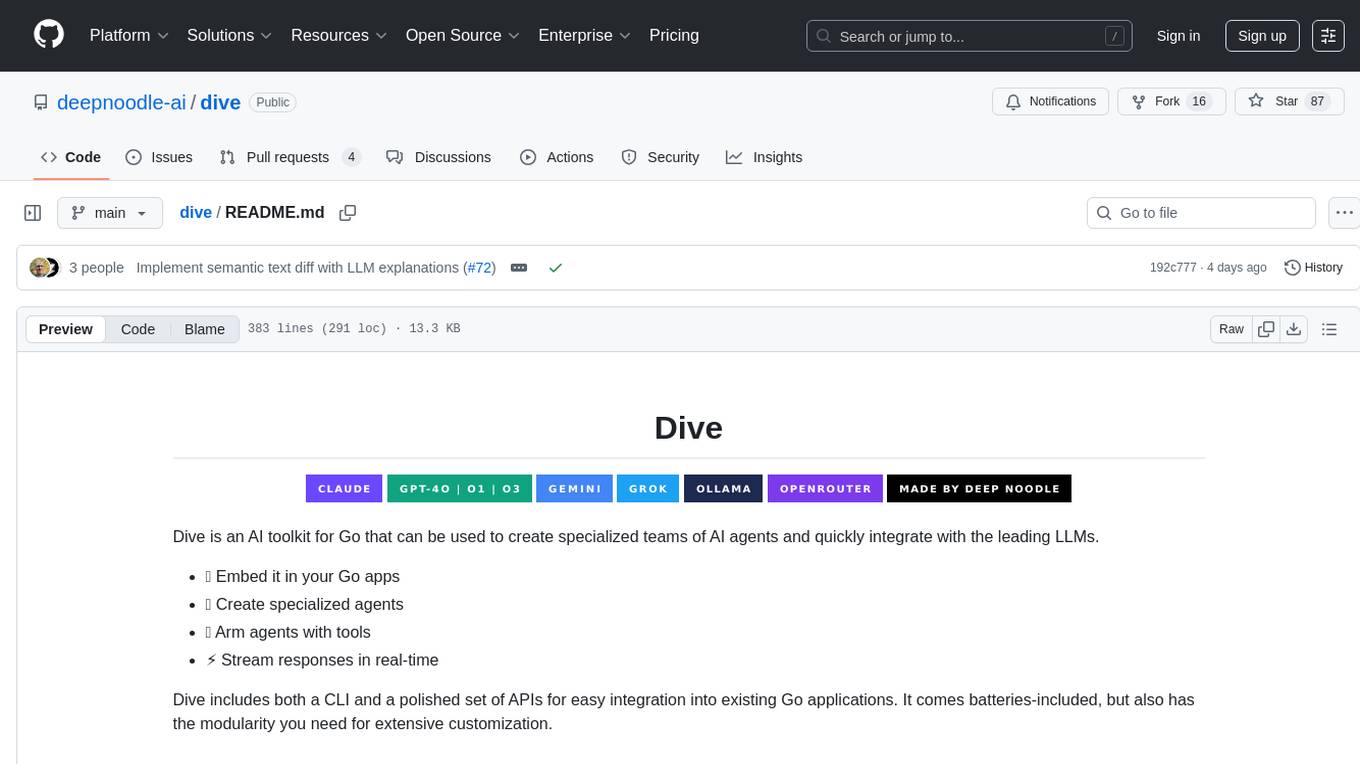
dive
Dive is an AI toolkit for Go that enables the creation of specialized teams of AI agents and seamless integration with leading LLMs. It offers a CLI and APIs for easy integration, with features like creating specialized agents, hierarchical agent systems, declarative configuration, multiple LLM support, extended reasoning, model context protocol, advanced model settings, tools for agent capabilities, tool annotations, streaming, CLI functionalities, thread management, confirmation system, deep research, and semantic diff. Dive also provides semantic diff analysis, unified interface for LLM providers, tool system with annotations, custom tool creation, and support for various verified models. The toolkit is designed for developers to build AI-powered applications with rich agent capabilities and tool integrations.
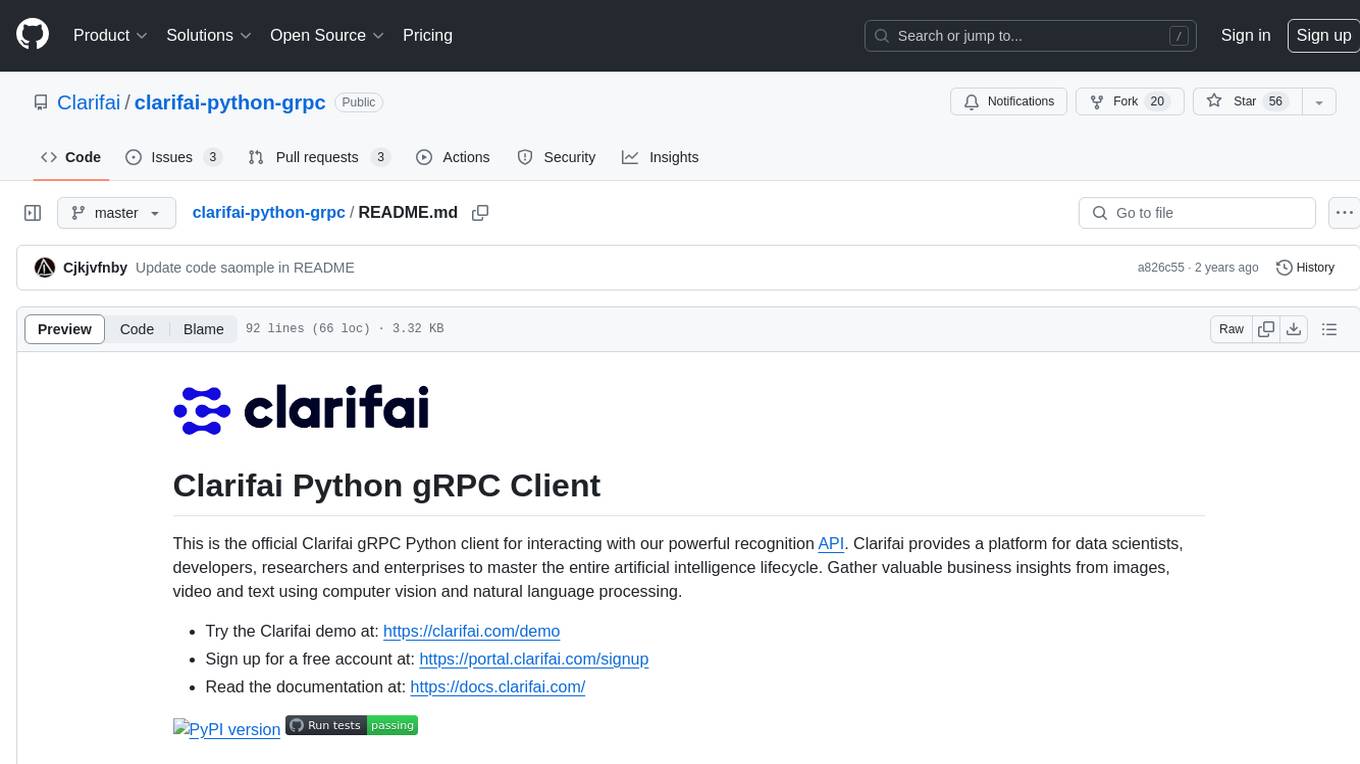
clarifai-python-grpc
This is the official Clarifai gRPC Python client for interacting with their recognition API. Clarifai offers a platform for data scientists, developers, researchers, and enterprises to utilize artificial intelligence for image, video, and text analysis through computer vision and natural language processing. The client allows users to authenticate, predict concepts in images, and access various functionalities provided by the Clarifai API. It follows a versioning scheme that aligns with the backend API updates and includes specific instructions for installation and troubleshooting. Users can explore the Clarifai demo, sign up for an account, and refer to the documentation for detailed information.
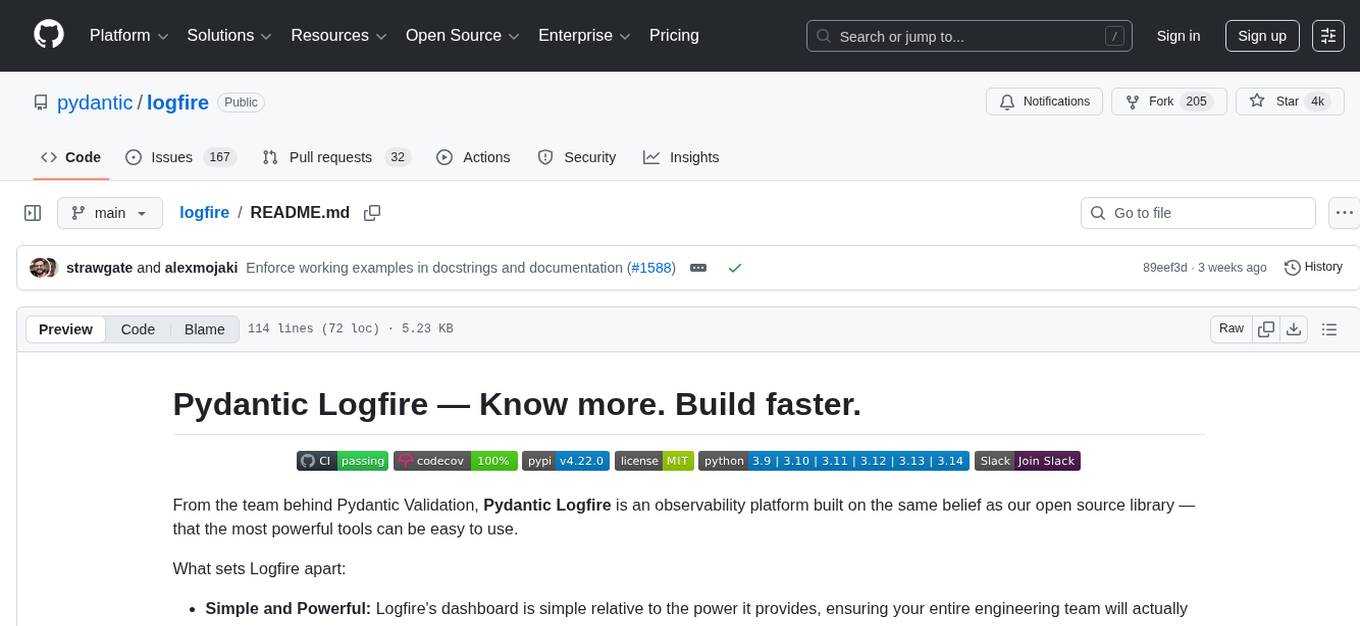
logfire
Pydantic Logfire is an observability platform that provides simple and powerful dashboard, Python-centric insights, SQL querying, OpenTelemetry integration, and Pydantic validation analytics. It offers unparalleled visibility into Python applications' behavior and allows querying data using standard SQL. Logfire is an opinionated wrapper around OpenTelemetry, supporting traces, metrics, and logs. The Python SDK for logfire is open source, while the server application for recording and displaying data is closed source.
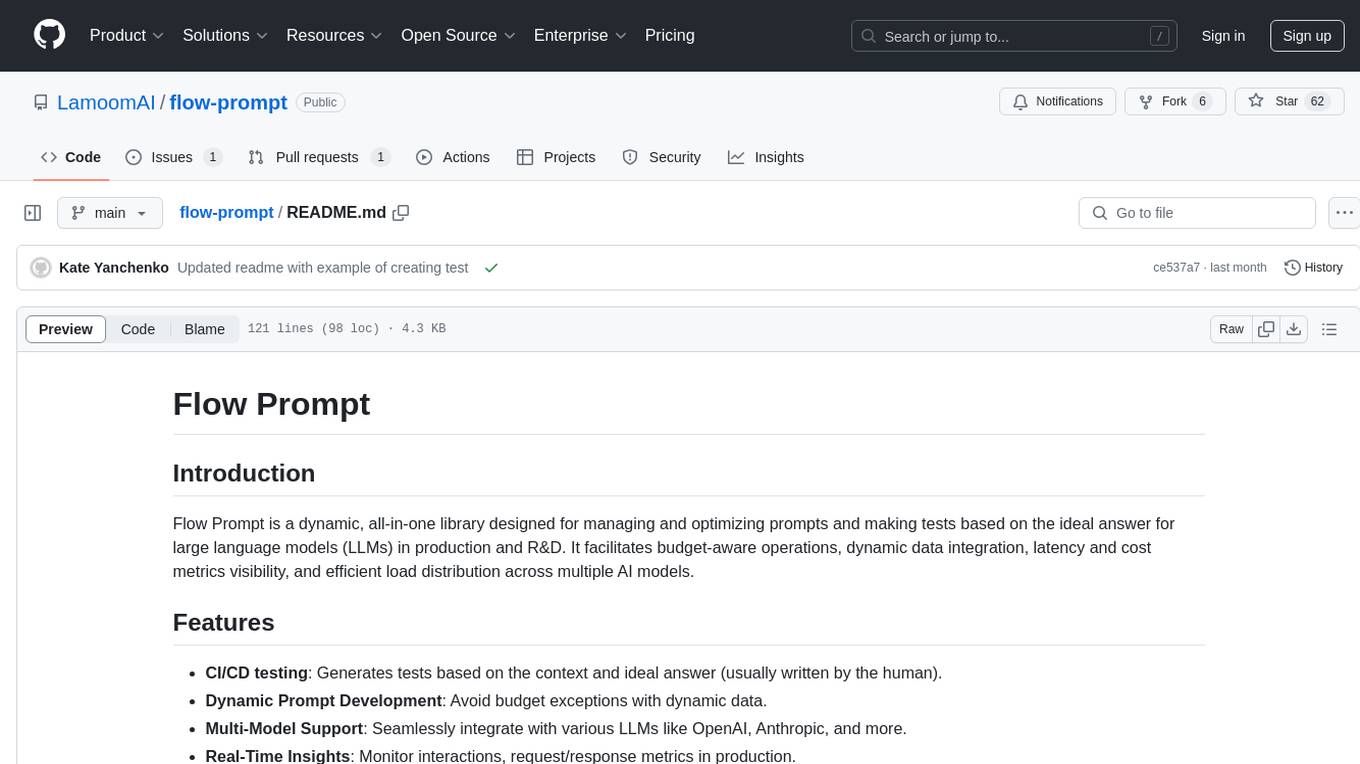
flow-prompt
Flow Prompt is a dynamic library for managing and optimizing prompts for large language models. It facilitates budget-aware operations, dynamic data integration, and efficient load distribution. Features include CI/CD testing, dynamic prompt development, multi-model support, real-time insights, and prompt testing and evolution.
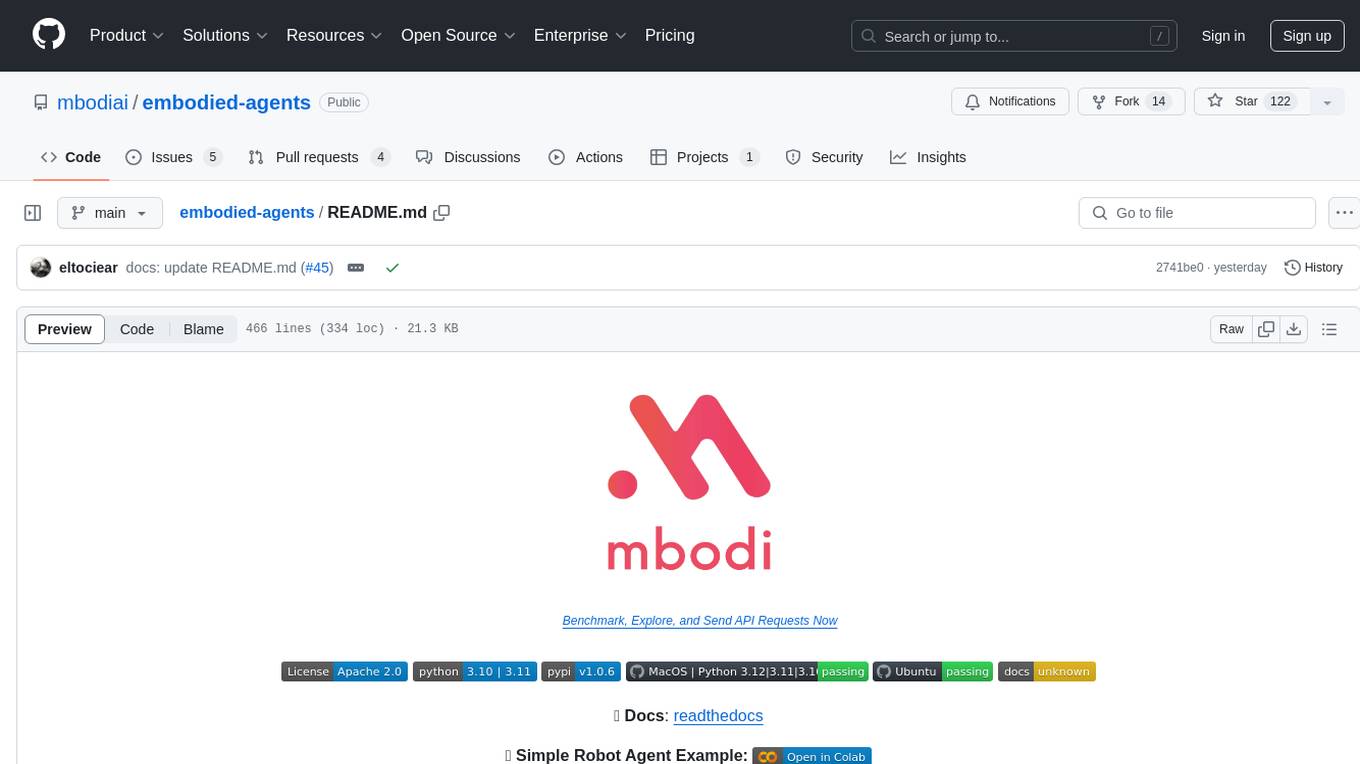
embodied-agents
Embodied Agents is a toolkit for integrating large multi-modal models into existing robot stacks with just a few lines of code. It provides consistency, reliability, scalability, and is configurable to any observation and action space. The toolkit is designed to reduce complexities involved in setting up inference endpoints, converting between different model formats, and collecting/storing datasets. It aims to facilitate data collection and sharing among roboticists by providing Python-first abstractions that are modular, extensible, and applicable to a wide range of tasks. The toolkit supports asynchronous and remote thread-safe agent execution for maximal responsiveness and scalability, and is compatible with various APIs like HuggingFace Spaces, Datasets, Gymnasium Spaces, Ollama, and OpenAI. It also offers automatic dataset recording and optional uploads to the HuggingFace hub.
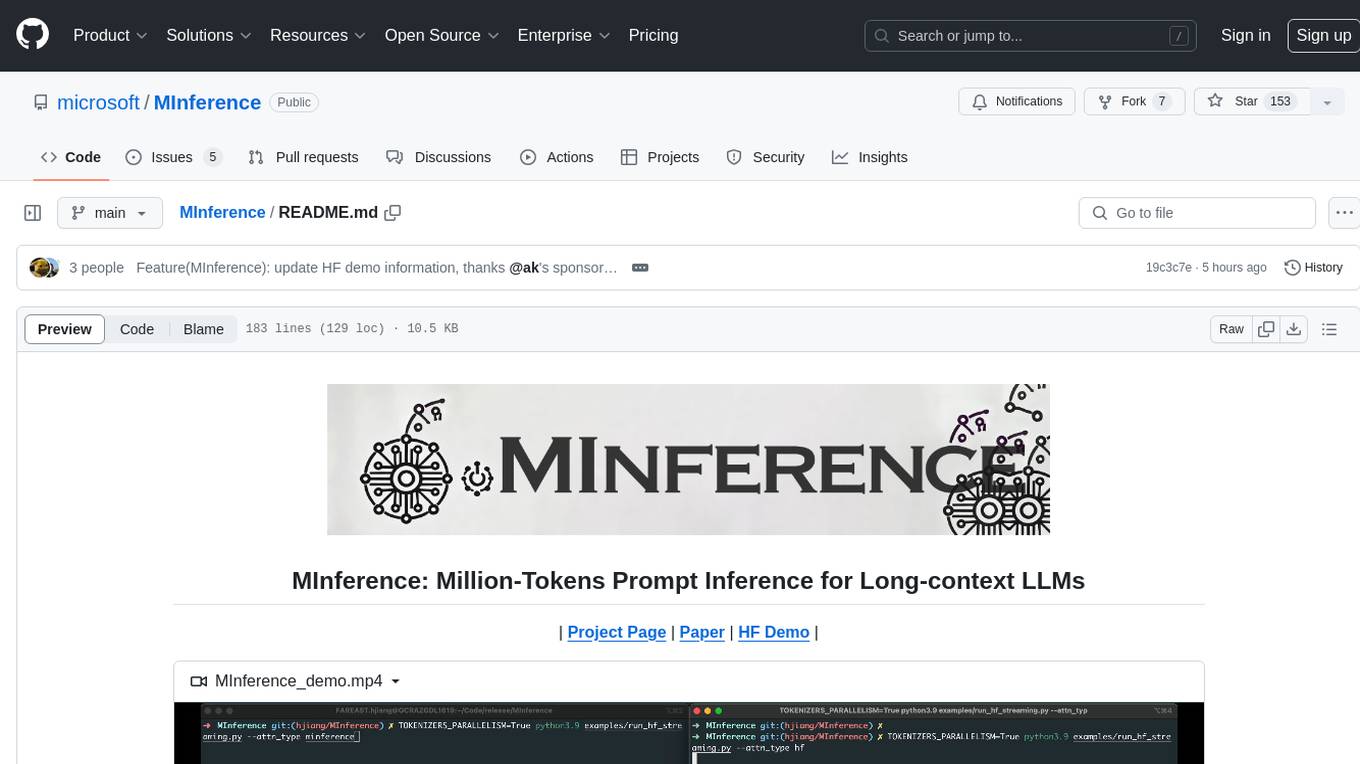
MInference
MInference is a tool designed to accelerate pre-filling for long-context Language Models (LLMs) by leveraging dynamic sparse attention. It achieves up to a 10x speedup for pre-filling on an A100 while maintaining accuracy. The tool supports various decoding LLMs, including LLaMA-style models and Phi models, and provides custom kernels for attention computation. MInference is useful for researchers and developers working with large-scale language models who aim to improve efficiency without compromising accuracy.

deep-research
Deep Research is a lightning-fast tool that uses powerful AI models to generate comprehensive research reports in just a few minutes. It leverages advanced 'Thinking' and 'Task' models, combined with an internet connection, to provide fast and insightful analysis on various topics. The tool ensures privacy by processing and storing all data locally. It supports multi-platform deployment, offers support for various large language models, web search functionality, knowledge graph generation, research history preservation, local and server API support, PWA technology, multi-key payload support, multi-language support, and is built with modern technologies like Next.js and Shadcn UI. Deep Research is open-source under the MIT License.
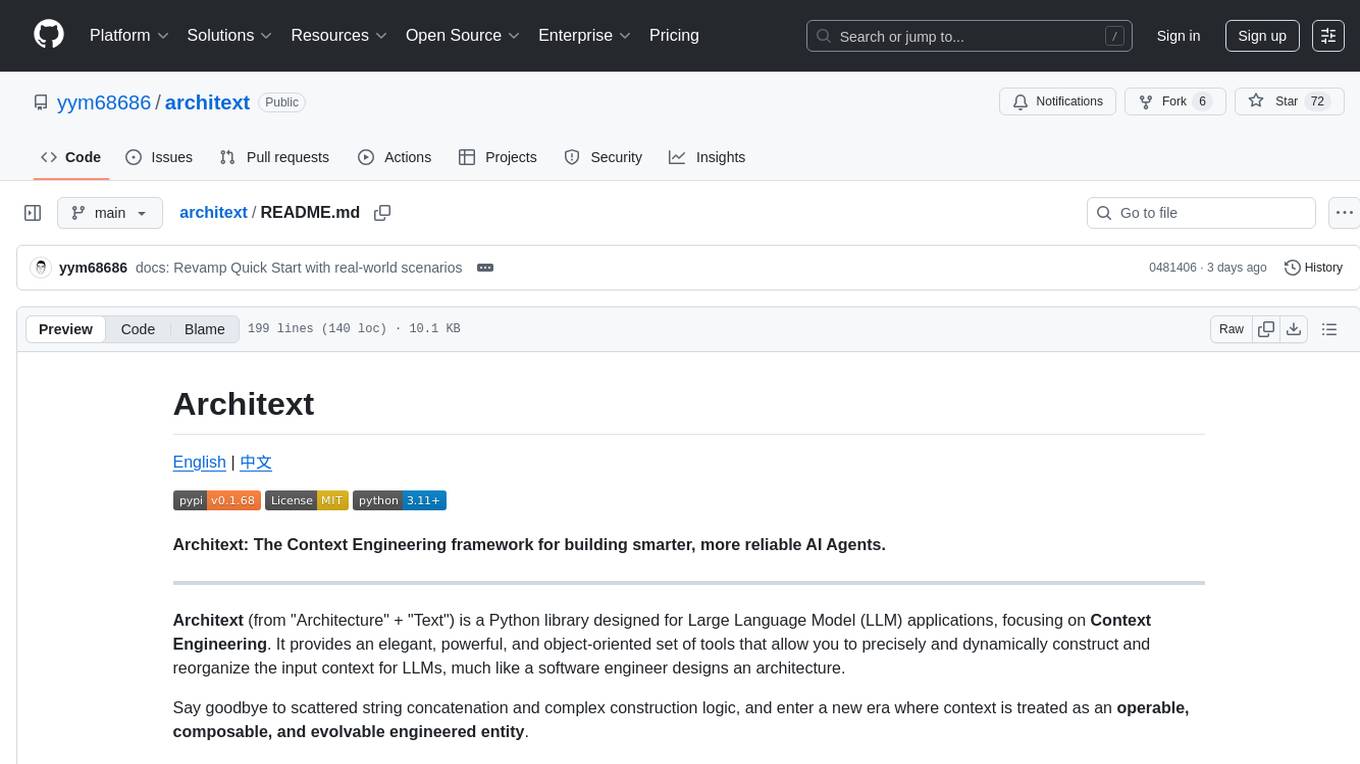
architext
Architext is a Python library designed for Large Language Model (LLM) applications, focusing on Context Engineering. It provides tools to construct and reorganize input context for LLMs dynamically. The library aims to elevate context construction from ad-hoc to systematic engineering, enabling precise manipulation of context content for AI Agents.

semantic-kernel
Semantic Kernel is an SDK that integrates Large Language Models (LLMs) like OpenAI, Azure OpenAI, and Hugging Face with conventional programming languages like C#, Python, and Java. Semantic Kernel achieves this by allowing you to define plugins that can be chained together in just a few lines of code. What makes Semantic Kernel _special_ , however, is its ability to _automatically_ orchestrate plugins with AI. With Semantic Kernel planners, you can ask an LLM to generate a plan that achieves a user's unique goal. Afterwards, Semantic Kernel will execute the plan for the user.
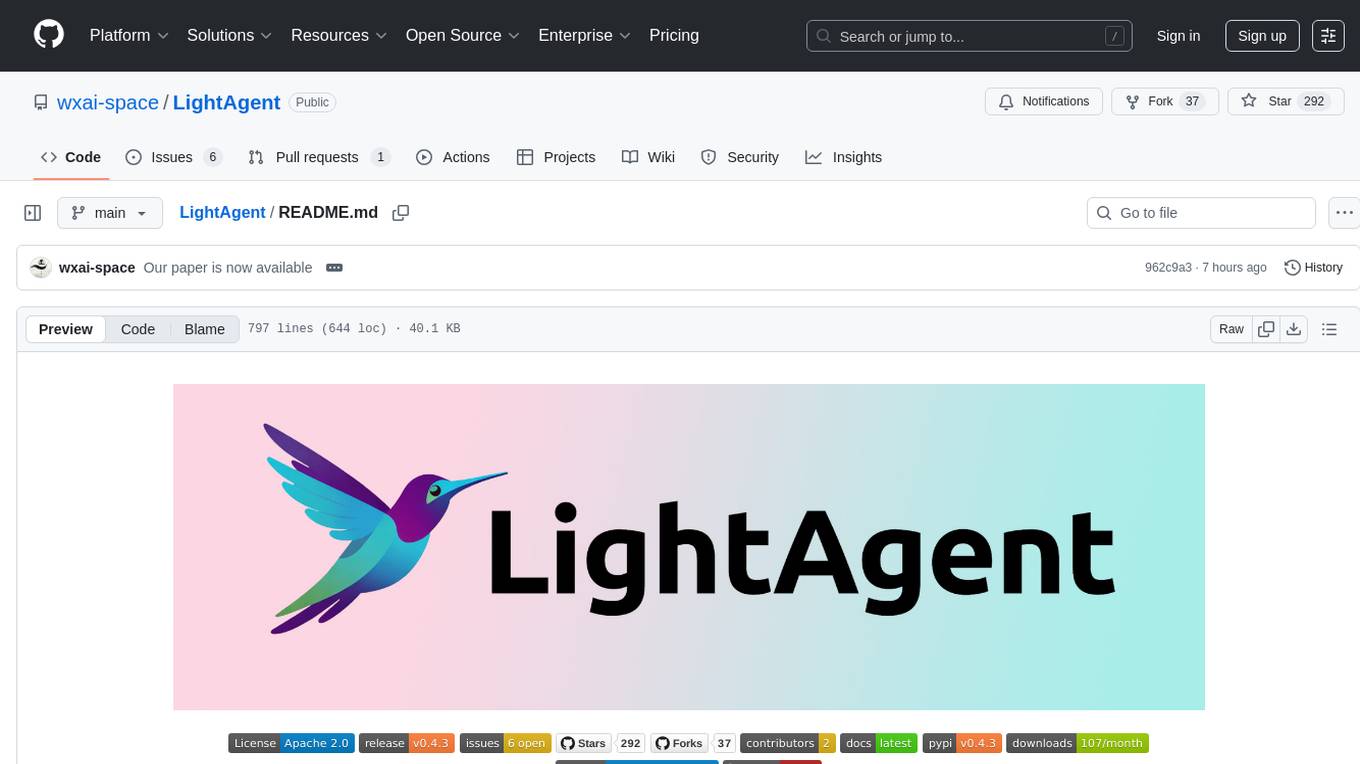
LightAgent
LightAgent is a lightweight, open-source Agentic AI development framework with memory, tools, and a tree of thought. It supports multi-agent collaboration, autonomous learning, tool integration, complex task handling, and multi-model support. It also features a streaming API, tool generator, agent self-learning, adaptive tool mechanism, and more. LightAgent is designed for intelligent customer service, data analysis, automated tools, and educational assistance.
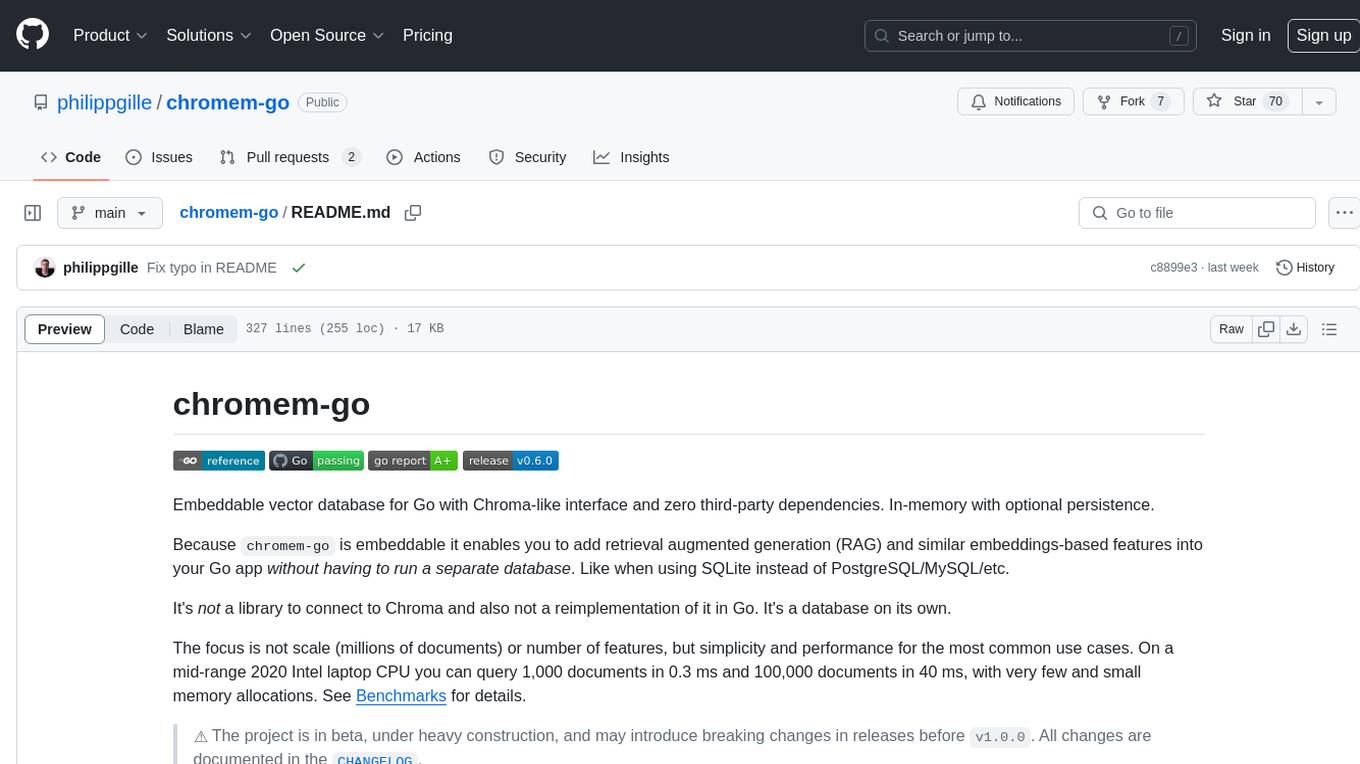
chromem-go
chromem-go is an embeddable vector database for Go with a Chroma-like interface and zero third-party dependencies. It enables retrieval augmented generation (RAG) and similar embeddings-based features in Go apps without the need for a separate database. The focus is on simplicity and performance for common use cases, allowing querying of documents with minimal memory allocations. The project is in beta and may introduce breaking changes before v1.0.0.
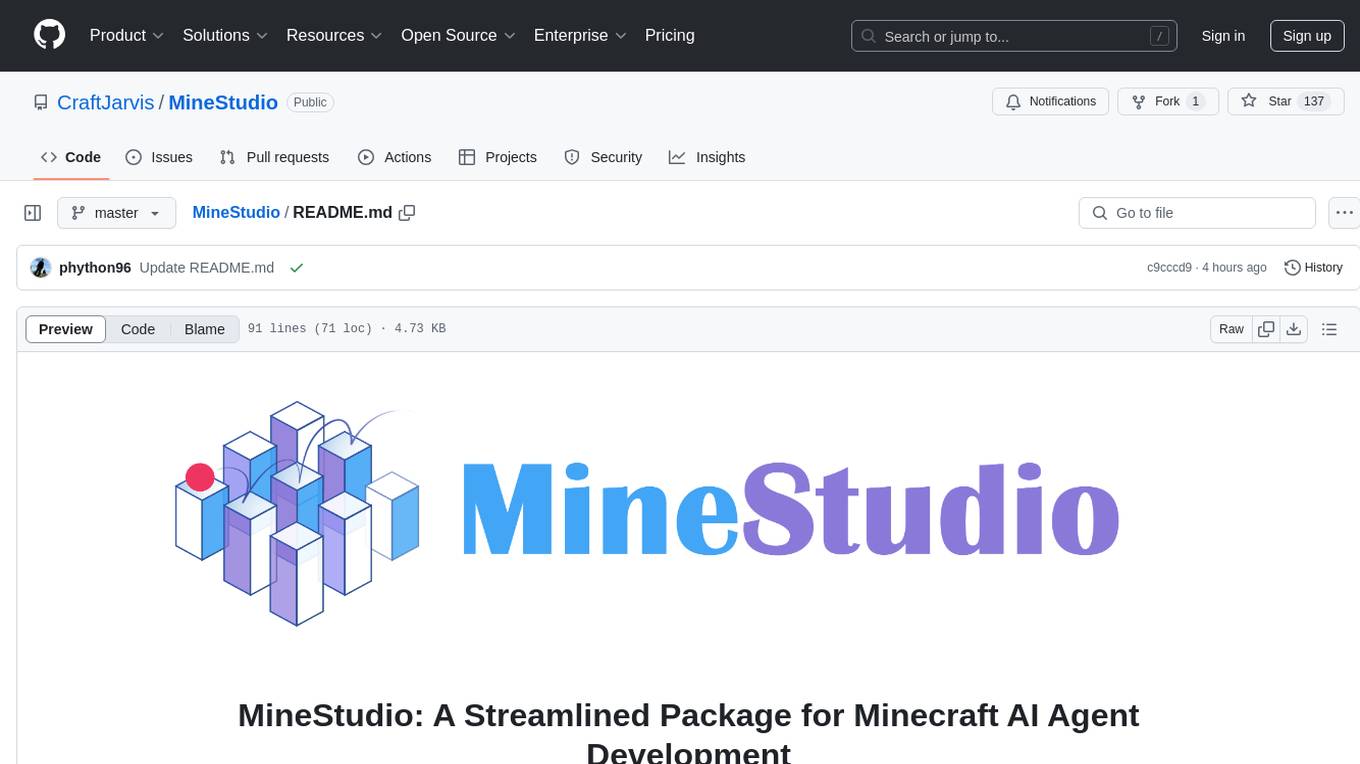
MineStudio
MineStudio is a simple and efficient Minecraft development kit for AI research. It contains tools and APIs for developing Minecraft AI agents, including a customizable simulator, trajectory data structure, policy models, offline and online training pipelines, inference framework, and benchmarking automation. The repository is under development and welcomes contributions and suggestions.
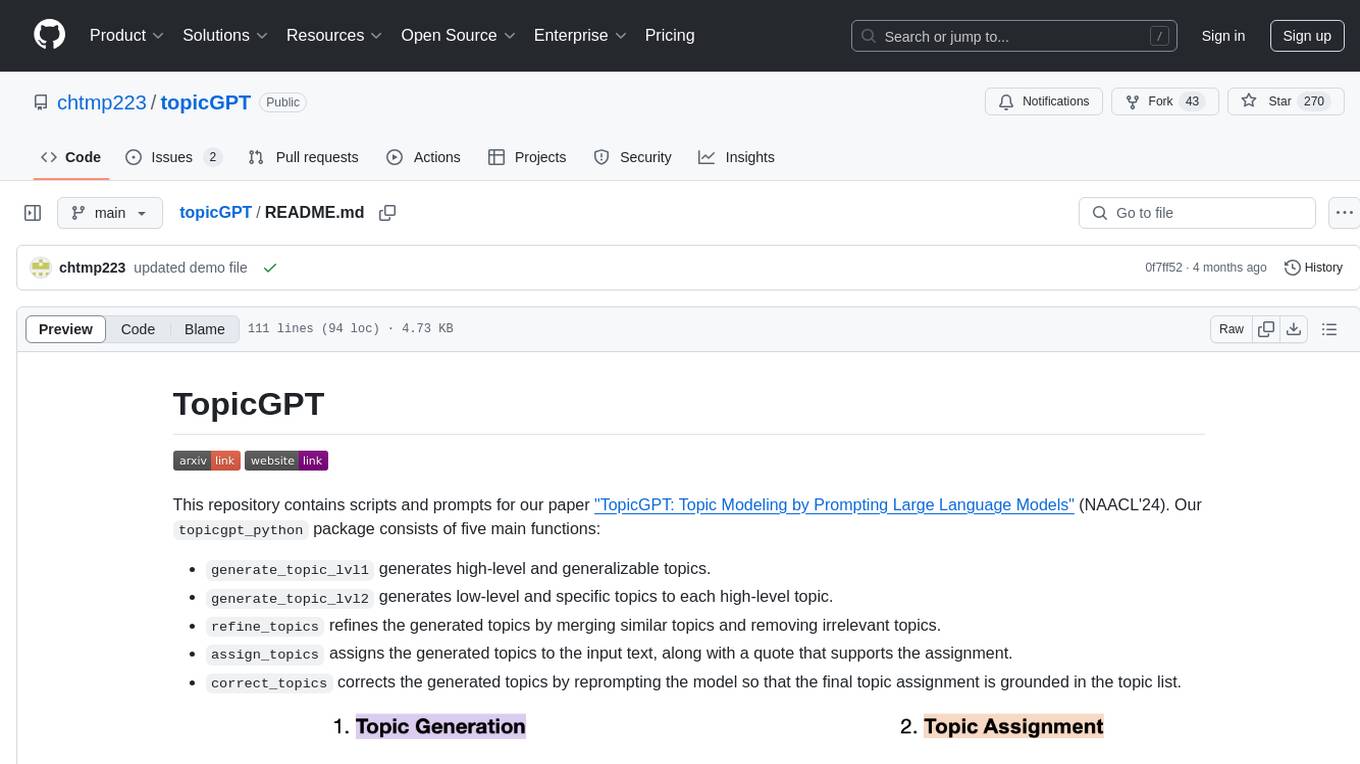
topicGPT
TopicGPT is a repository containing scripts and prompts for the paper 'TopicGPT: Topic Modeling by Prompting Large Language Models' (NAACL'24). The 'topicgpt_python' package offers functions to generate high-level and specific topics, refine topics, assign topics to input text, and correct generated topics. It supports various APIs like OpenAI, VertexAI, Azure, Gemini, and vLLM for inference. Users can prepare data in JSONL format, run the pipeline using provided scripts, and evaluate topic alignment with ground-truth labels.
For similar tasks
XLICON-V2-MD
XLICON-V2-MD is a versatile Multi-Device WhatsApp bot developed by Salman Ahamed. It offers a wide range of features, making it an advanced and user-friendly bot for various purposes. The bot supports multi-device operation, AI photo enhancement, downloader commands, hidden NSFW commands, logo generation, anime exploration, economic activities, games, and audio/video editing. Users can deploy the bot on platforms like Heroku, Replit, Codespace, Okteto, Railway, Mongenius, Coolify, and Render. The bot is maintained by Salman Ahamed and Abraham Dwamena, with contributions from various developers and testers. Misusing the bot may result in a ban from WhatsApp, so users are advised to use it at their own risk.
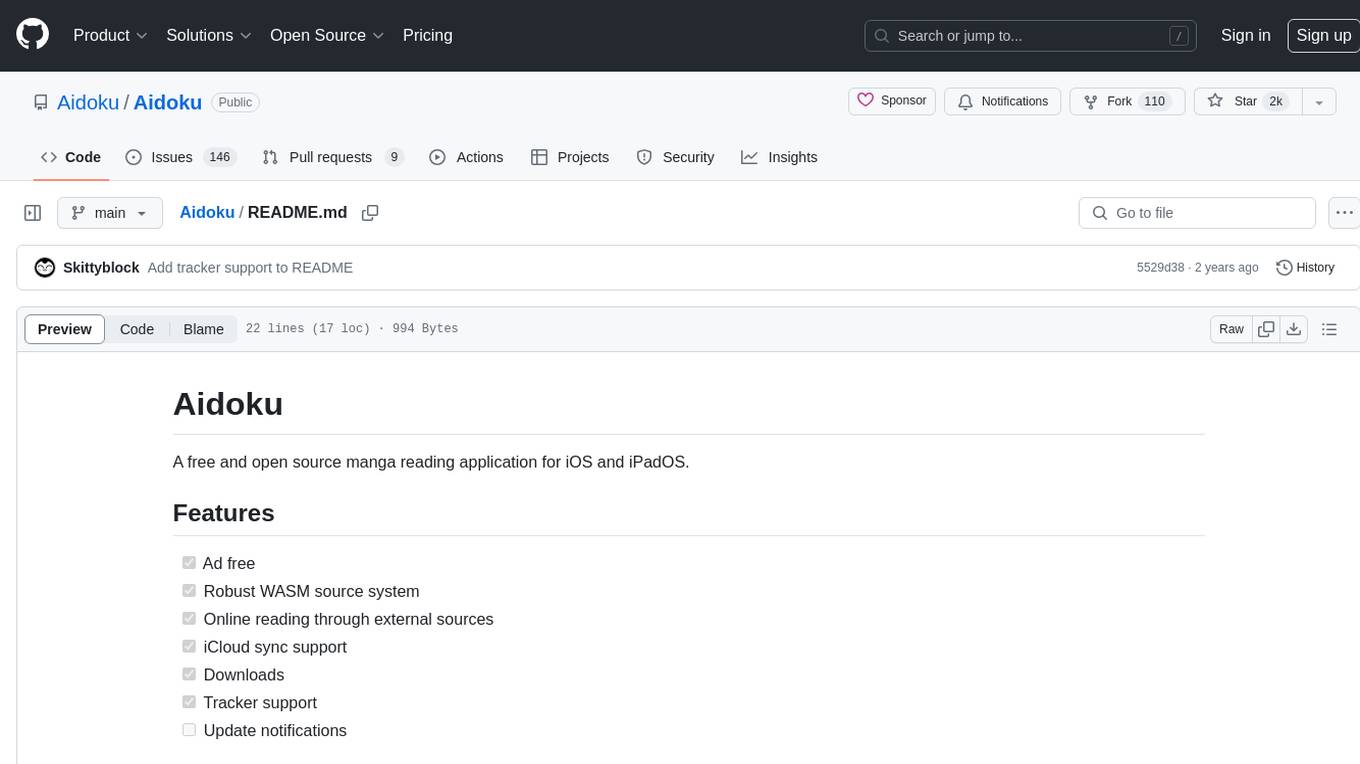
Aidoku
Aidoku is a free and open source manga reading application for iOS and iPadOS. It offers features like ad-free experience, robust WASM source system, online reading through external sources, iCloud sync support, downloads, and tracker support. Users can access the latest ipa from the releases page and join TestFlight via the Aidoku Discord for detailed installation instructions. The project is open to contributions, with planned features and fixes. Translation efforts are welcomed through Weblate for crowd-sourced translations.
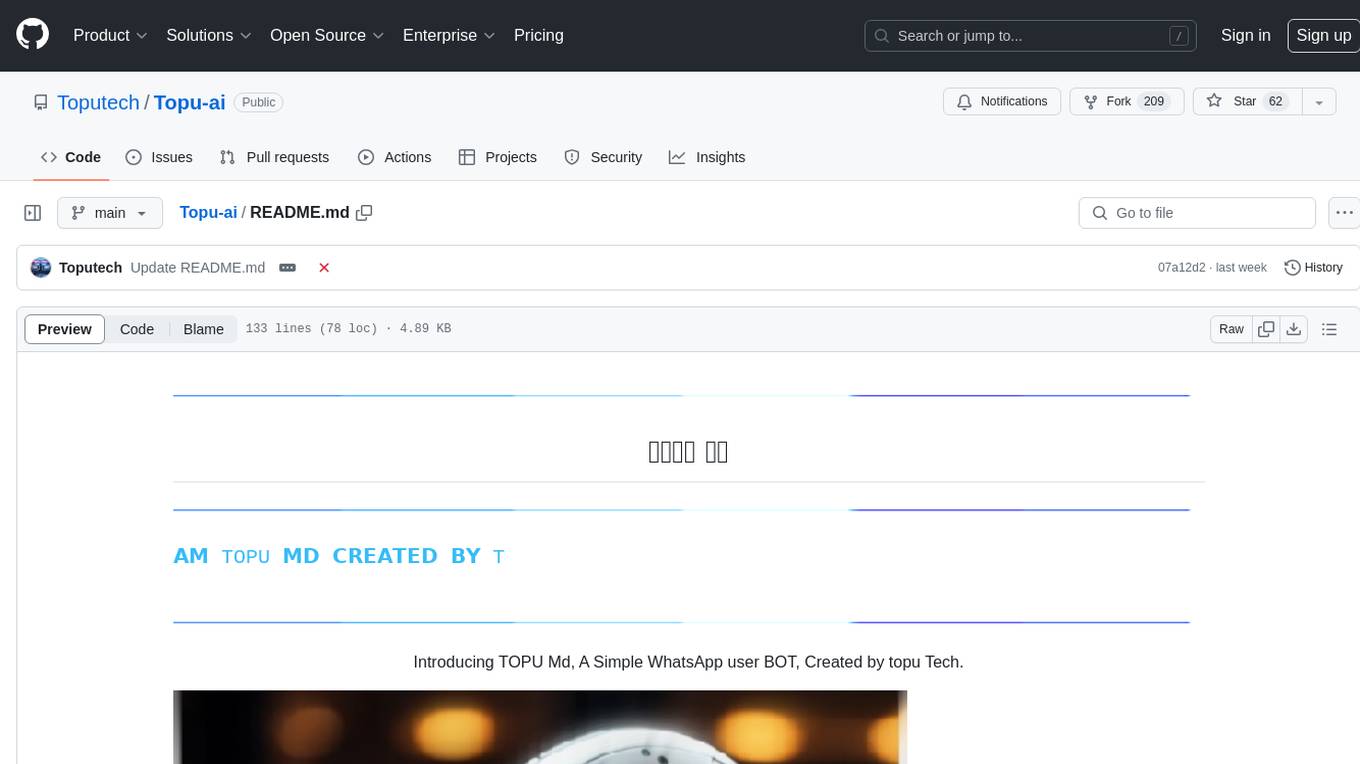
Topu-ai
TOPU Md is a simple WhatsApp user bot created by Topu Tech. It offers various features such as multi-device support, AI photo enhancement, downloader commands, hidden NSFW commands, logo commands, anime commands, economy menu, various games, and audio/video editor commands. Users can fork the repo, get a session ID by pairing code, and deploy on Heroku. The bot requires Node version 18.x or higher for optimal performance. Contributions to TOPU-MD are welcome, and the tool is safe for use on WhatsApp and Heroku. The tool is licensed under the MIT License and is designed to enhance the WhatsApp experience with diverse features.
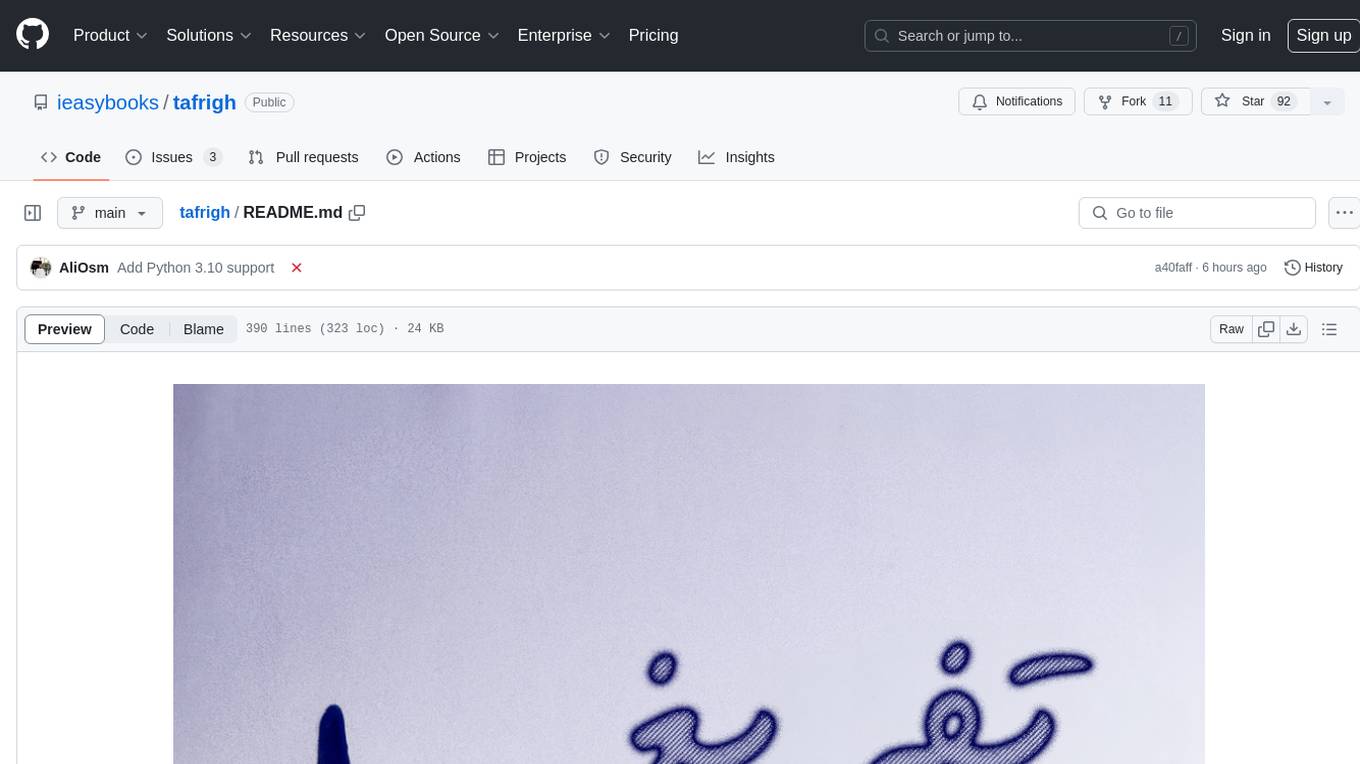
tafrigh
Tafrigh is a tool for transcribing visual and audio content into text using advanced artificial intelligence techniques provided by OpenAI and wit.ai. It allows direct downloading of content from platforms like YouTube, Facebook, Twitter, and SoundCloud, and provides various output formats such as txt, srt, vtt, csv, tsv, and json. Users can install Tafrigh via pip or by cloning the GitHub repository and using Poetry. The tool supports features like skipping transcription if output exists, specifying playlist items, setting download retries, using different Whisper models, and utilizing wit.ai for transcription. Tafrigh can be used via command line or programmatically, and Docker images are available for easy usage.

aiograpi
aiograpi is an asynchronous Instagram API wrapper for Python that allows users to interact with various Instagram functionalities such as retrieving public data of users, posts, stories, followers, and following users, managing proxy servers and challenge resolver, login by different methods, managing messages and threads, downloading and uploading various types of content, working with insights, likes, comments, and more. It is designed for testing or research purposes rather than production business use.
For similar jobs

lollms-webui
LoLLMs WebUI (Lord of Large Language Multimodal Systems: One tool to rule them all) is a user-friendly interface to access and utilize various LLM (Large Language Models) and other AI models for a wide range of tasks. With over 500 AI expert conditionings across diverse domains and more than 2500 fine tuned models over multiple domains, LoLLMs WebUI provides an immediate resource for any problem, from car repair to coding assistance, legal matters, medical diagnosis, entertainment, and more. The easy-to-use UI with light and dark mode options, integration with GitHub repository, support for different personalities, and features like thumb up/down rating, copy, edit, and remove messages, local database storage, search, export, and delete multiple discussions, make LoLLMs WebUI a powerful and versatile tool.

Azure-Analytics-and-AI-Engagement
The Azure-Analytics-and-AI-Engagement repository provides packaged Industry Scenario DREAM Demos with ARM templates (Containing a demo web application, Power BI reports, Synapse resources, AML Notebooks etc.) that can be deployed in a customer’s subscription using the CAPE tool within a matter of few hours. Partners can also deploy DREAM Demos in their own subscriptions using DPoC.

minio
MinIO is a High Performance Object Storage released under GNU Affero General Public License v3.0. It is API compatible with Amazon S3 cloud storage service. Use MinIO to build high performance infrastructure for machine learning, analytics and application data workloads.

mage-ai
Mage is an open-source data pipeline tool for transforming and integrating data. It offers an easy developer experience, engineering best practices built-in, and data as a first-class citizen. Mage makes it easy to build, preview, and launch data pipelines, and provides observability and scaling capabilities. It supports data integrations, streaming pipelines, and dbt integration.

AiTreasureBox
AiTreasureBox is a versatile AI tool that provides a collection of pre-trained models and algorithms for various machine learning tasks. It simplifies the process of implementing AI solutions by offering ready-to-use components that can be easily integrated into projects. With AiTreasureBox, users can quickly prototype and deploy AI applications without the need for extensive knowledge in machine learning or deep learning. The tool covers a wide range of tasks such as image classification, text generation, sentiment analysis, object detection, and more. It is designed to be user-friendly and accessible to both beginners and experienced developers, making AI development more efficient and accessible to a wider audience.

tidb
TiDB is an open-source distributed SQL database that supports Hybrid Transactional and Analytical Processing (HTAP) workloads. It is MySQL compatible and features horizontal scalability, strong consistency, and high availability.

airbyte
Airbyte is an open-source data integration platform that makes it easy to move data from any source to any destination. With Airbyte, you can build and manage data pipelines without writing any code. Airbyte provides a library of pre-built connectors that make it easy to connect to popular data sources and destinations. You can also create your own connectors using Airbyte's no-code Connector Builder or low-code CDK. Airbyte is used by data engineers and analysts at companies of all sizes to build and manage their data pipelines.

labelbox-python
Labelbox is a data-centric AI platform for enterprises to develop, optimize, and use AI to solve problems and power new products and services. Enterprises use Labelbox to curate data, generate high-quality human feedback data for computer vision and LLMs, evaluate model performance, and automate tasks by combining AI and human-centric workflows. The academic & research community uses Labelbox for cutting-edge AI research.


